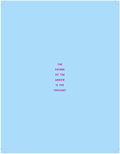Christopher DeWeese: The Father of the Arrow Is the Thought
“Half-winged—half-imprisoned, this is man!” —Paul Klee
Can the body ever catch up to the imagination of the mind? How do we reconcile our ambitions to expand and conquer? Christopher DeWeese’s second collection, The Father of the Arrow Is the Thought, examines the limitations of man in spaces unphased by idea or ego. We travel, at the speed of the arrow, through “The Atmosphere,” to the “The Sky,” across “The Lake,” and beyond, with a cynical yet endearing speaker obsessed with the inhale and exhale of nature. These poems do not breathe shallowly; if all poems are indeed somewhat political, than Deweese’s second collection must also be categorized as philosophical, historical, even. We see the ghosts of settlers past, of dead and great poets, and more than a few glimpses of war, all filtered through the voice of a speaker on the run. As suggested in the final long poem, “The Tide,” “it is so easy / not to articulate / what remains underneath the image,” and yet, Deweese is a master of articulating just that. There is so much more here than beautifully characterized land and seascapes, as these poems are not so much preoccupied with physiographical location so much as ownership, sacrifice, and movement.
The collection begins with “The Atmosphere,” and immediately demonstrates Deweese’s control over speed and precision as he zooms through the natural, lingers in the anecdotal, and settles (briefly) in the comical:
The light bent swans
between the clouds,
nasty, angry swans
we could almost feel
fucking up our ethos.
It reminded me of
when we stole the chicken,
how it kept so quiet
we dropped the knife
and just stood there,
stuck around the pentagram
like dumbfounded policemen
who’ve accidentally uncovered
a whole town of nudists.
As the poem continues to travel across scene and scope, we are introduced to one of the main, pervading themes in the book: the question of duty. Are we to remain loyal to the tangible and natural? Or is fantasy, human ingenuity, the ultimate destination? “The Atmosphere,” does not decide for us, but instead reminds us:
that from dirt
grow proud tomatoes,
and countless ideas
from our days.
The travel-size ghosts.
The sandbags we throw
to help us get away.
Deweese is at his best when he allows his speaker unapologetic command over vulnerability, such as in “The Stream.” Here, we’re not only given some sense of backstory as to the motivations behind the voyage of the speaker (although it’s questionable how reliable the information presented is), but we also get a glimpse into the self-awareness of the speaker, and their desire to connect with the permanent:
I guess I must have been an optimist,
stuck in this raw belief
that if only I could stop living
outside the poem,
its words would open up
the way shadows do
when you view their source
and then the sun.
The poem weaves personal identity in and out of iconic and textured backdrops, but as the poem itself describes, “when you take out the visual, / what’s left is a feeling.”
Although we traverse both orchard and marsh, there is surprisingly little variety in the structure and form of the collection. Nearly every poem follows the same strict adherence to short, mostly end-stopped lines, and each piece expands onto a comfortable two pages or more. This, coupled with the familiar and repeated imagery of night, breath, and bones, can, at times, leave you wishing our journey introduced an abrupt fork in-the road. However, these choices are not without their intentionality, as there is an obvious sense of progression in the mindset of the speaker as their vitality is tested again and again by the land. The Father of the Arrow Is the Thought is a near perfect example of how to infuse nature poems with pizzazz and a healthy dose of breadth. Christopher Deweese’s second collection is yet another winner from Octopus Books that roots itself in both the modern, and the timeless.
 Christopher DeWeese
Christopher DeWeese